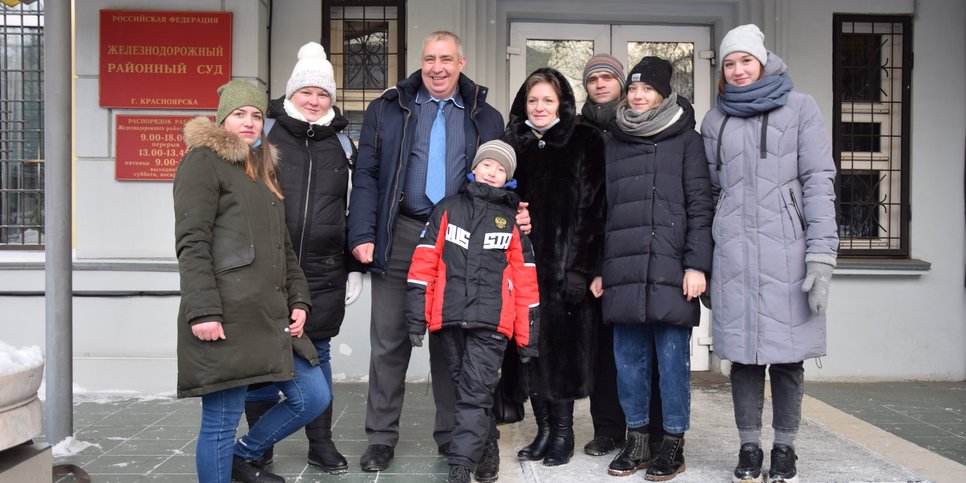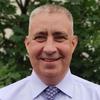In the photo: Vitaliy Sukhov with his wife and children on the day of sentencing
In the photo: Vitaliy Sukhov with his wife and children on the day of sentencing
In Krasnoyarsk, Father of 8 Children, Vitaliy Sukhov, Given 6 Years of Suspended Sentence for Reading the Bible
Krasnoyarsk TerritoryOn December 21, 2021, the judge of the Zheleznodorozhny District Court of the city of Krasnoyarsk, Svetlana Patsalyuk, found the father of many children Vitaliy Sukhov guilty of organizing the activities of the extremist community and sentenced him to 6 years of suspended imprisonment.
The verdict has not entered into force and can be appealed. The believer insists on his complete innocence.
Although there is not a single victim in the case, the prosecutor asked the court to sentence the believer to 6 years in prison.
In his last word in court, Sukhov emphasized: “I want to assure the court of my innocence before the law, before people and before God ... I never had a desire to harm people, neither by action nor by inaction. I love my country, our city, and everyone who comes in contact with me knows this. The fact that I now stand before the court proves that I am ready to make sacrifices for the welfare and interests of the citizens of my homeland. I can’t help but tell others what I know and what can benefit them. ”
On May 8, 2020, the senior investigator of the Main Investigation Department of the Investigative Committee for the Krasnoyarsk Territory and Khakassia, Lieutenant P. Filishkan opened a criminal case under Part 1 of Art. 282.2 of the Criminal Code of the Russian Federation against Vitaliy Sukhov, father of eight children. Two weeks later, the security forces searched his apartment. On that day, the believer learned that he was suspected of "organizing religious performances and services." Later, the court seized Sukhov's car, depriving him of the right to use his property. This measure was taken in order to recover it from the cost of the car in the event of a penalty in the form of a fine. Investigator Filishkan investigated the case for about 11 months. On March 25, 2021, the case was submitted to the Zheleznodorozhny District Court of Krasnoyarsk.
The criminal case involved the testimony of a secret witness "Kuzmin," who attended services of Jehovah's Witnesses in 2017-18. In court, he argued that these were allegedly meetings of the local religious organization of Jehovah's Witnesses "Krasnoyarsk." However, he said that he had not read the charter of this organization and did not know who was a member of it.
Two other witnesses for the prosecution said that they had no complaints against Sukhov, he did not agitate them to join any organization, and that Jehovah's Witnesses were not considered extremists.
A religious examination carried out in this criminal case confirmed that “participation in meetings and training events”, “preaching work, which consists in the purposeful dissemination of the teachings of Jehovah's Witnesses,” as well as “observance of theocratic order” are “forms of expression of faith.”
At one of the court sessions, Vitaliy Sukhov drew attention to the fact that the investigator did not indicate the essence of the charge, the place and time of the crime, its methods, motives, goals, consequences and other circumstances. In this connection, he concluded: “Since these provisions have not been observed, the prosecution does not meet the requirements of Art. 220 of the Code of Criminal Procedure of the Russian Federation, therefore, the criminal case must be returned to the prosecutor." However, the court did not satisfy this request.
In the Krasnoyarsk Territory, 18 Jehovah's Witnesses are already accused of crimes against society and the state, although they did not commit anything illegal. Three of them have already been convicted for their faith.
According to the ruling of the Plenum of the Supreme Court of the Russian Federation No. 32, when considering a criminal case on a crime provided for in Article 282.2 of the Criminal Code of the Russian Federation, the court must take into account that religious associations “consisting exclusively in the exercise of their right to freedom of conscience and freedom of religion, including through individual or joint the confession of religion, the performance of divine services or other religious rites and ceremonies, in themselves, if they do not contain signs of extremism, do not constitute a crime."

